2010年12月大学英语六级考试试题和答案(整理版)
2010年12月英语6级真题标准答案(含详细解析)
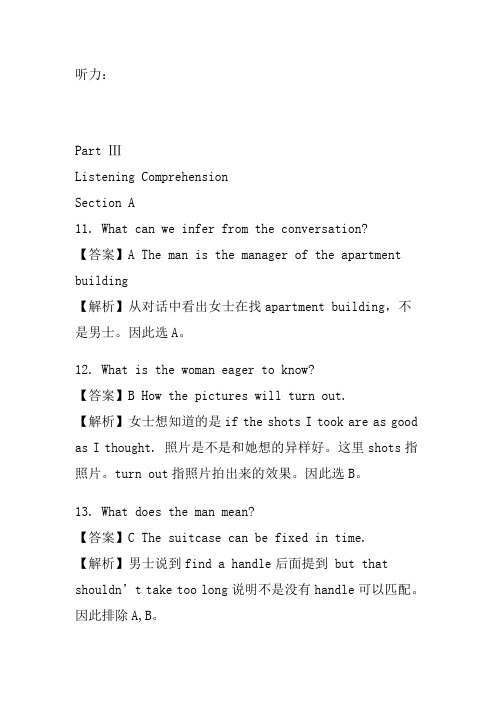
听力:Part ⅢListening ComprehensionSection A11. What can we infer from the conversation?【答案】A The man is the manager of the apartment building【解析】从对话中看出女士在找apartment building,不是男士。
因此选A。
12. What is the woman eager to know?【答案】B How the pictures will turn out.【解析】女士想知道的是if the shots I took are as good as I thought. 照片是不是和她想的异样好。
这里shots指照片。
turn out指照片拍出来的效果。
因此选B。
13. What does the man mean?【答案】C The suitcase can be fixed in time.【解析】男士说到find a handle后面提到 but that shouldn’t take too long说明不是没有handle可以匹配。
因此排除A,B。
14. What do we learn about the man from the conversation?【答案】B He needs a vehicle to be used in harsh weather. 【解析】男士说到truck需要operate for long periods of time in very cold temperatures,因此选择选项B。
very cold temperatures对应harsh weather.15. What do we learn about the woman?【答案】A She has made up her mind to resign.【解析】从文中女士强硬的口气I could no longer live with…可以看出她下定决心。
2010年12月英语六级答案与解析

2010年12月大学英语六级真题答案(阅读部分)52--61 AADAD BBCDC2010年12月大学英语六级真题答案(完形填空部分)62 B set out set out plans表示制定计划63 C abandoning abandon 放弃,once unshakeable orthodoxy表示曾经不可动摇的做法,也就是现在要放弃了。
64 B with struggle with表示同…斗争,介词搭配,这里表示设法应对广告收入和报纸销售量下降的局面。
65 A intends intend to表示打算…,从后面的at the beginning of 2011,可知还没有这么做,只是计划或者打算这么做。
66 C exceeded 超过,是说当用户每月阅读文章超过一定量时就要收费。
67 C on 和side搭配,on the side of …表示拥护…;站在…一边。
68 B charge 本词在文章中多次出现,charge sb表示向某人收费。
69 B such as 表示举例,从后面举London's Evening Standard作为例子,可知应该选such as.70 B free 前面提到abandon readership revenue,即放弃读者收益,由此可知应该是make print editions free.71 D acknowledged 表示承认,这里表示Arthur Sulzberger承认这么做是一种赌博。
72 C bet 打赌,赌注,从前面的gamble可知应该选bet。
73 A circulation 发行量,从后面的数量可知应该选circulation。
74 A behind NYT排名第三,即排在the Wall Street Journal and USA Today后面。
75 C While while在这里表示对比,从上下文可知NYT与美国其他报纸不同。
2010年12月大学英语六级考试真题及答案及作文及听力原文
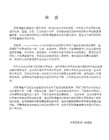
: What does the man mean?
14
M: This truck looks like what I need but I’m worried about maintenance. For us it’ll
have to operate for long periods of time in very cold temperatures.
W I once intended to sell it, but
W: We have several models that are especially adaptive for extreme conditions. Would you
like to see them?
: What do we learn about the man from the conversation?
gift for my wife.
W: Let me see. Oh, we’ve got uite a lot of women’s bags here. Can you give me more detailed
information, such as the color, the size and the trademark?
to wool.
M Maybe we can find something in cotton or silk. Please come this way.
;What does the women want to do?
17
M: Excuse me, Miss?Did anyone happen to turn in a new handbag? You know, it’s a birthday
2010年12月---2012年12月大学英语六级考试真题及答案
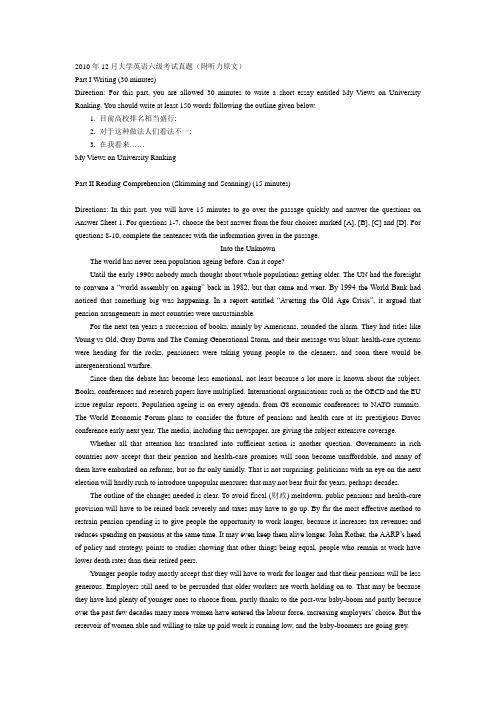
2010年12月大学英语六级考试真题(附听力原文)Part I Writing (30 minutes)Direction: For this part, you are allowed 30 minutes to write a short essay entitled My Views on University Ranking. You should write at least 150 words following the outline given below.1. 目前高校排名相当盛行;2. 对于这种做法人们看法不一;3. 在我看来……My Views on University RankingPart II Reading Comprehension (Skimming and Scanning) (15 minutes)Directions: In this part, you will have 15 minutes to go over the passage quickly and answer the questions on Answer Sheet 1. For questions 1-7, choose the best answer from the four choices marked [A], [B], [C] and [D]. For questions 8-10, complete the sentences with the information given in the passage.Into the UnknownThe world has never seen population ageing before. Can it cope?Until the early 1990s nobody much thought about whole populations getting older. The UN had the foresight to convene a ―world assembly on ageing‖ back in 1982, but that came and went. By 1994 the World Bank had noticed that something big was h appening. In a report entitled ―Averting the Old Age Crisis‖, it argued that pension arrangements in most countries were unsustainable.For the next ten years a succession of books, mainly by Americans, sounded the alarm. They had titles like Young vs Old, Gray Dawn and The Coming Generational Storm, and their message was blunt: health-care systems were heading for the rocks, pensioners were taking young people to the cleaners, and soon there would be intergenerational warfare.Since then the debate has become less emotional, not least because a lot more is known about the subject. Books, conferences and research papers have multiplied. International organisations such as the OECD and the EU issue regular reports. Population ageing is on every agenda, from G8 economic conferences to NA TO summits. The World Economic Forum plans to consider the future of pensions and health care at its prestigious Davos conference early next year. The media, including this newspaper, are giving the subject extensive coverage.Whether all that attention has translated into sufficient action is another question. Governments in rich countries now accept that their pension and health-care promises will soon become unaffordable, and many of them have embarked on reforms, but so far only timidly. That is not surprising: politicians with an eye on the next election will hardly rush to introduce unpopular measures that may not bear fruit for years, perhaps decades.The outline of the changes needed is clear. To avoid fiscal (财政) meltdown, public pensions and health-care provision will have to be reined back severely and taxes may have to go up. By far the most effective method to restrain pension spending is to give people the opportunity to work longer, because it increases tax revenues and reduces spending on pensions at the same time. It may even keep them alive longer. John Rother, the AARP’s head of policy and strategy, points to studies showing that other things being equal, people who remain at work have lower death rates than their retired peers.Younger people today mostly accept that they will have to work for longer and that their pensions will be less generous. Employers still need to be persuaded that older workers are worth holding on to. That may be because they have had plenty of younger ones to choose from, partly thanks to the post-war baby-boom and partly because over the past few decades many more women have entered the labour force, increasing employers’ choice. But the reservoir of women able and willing to take up paid work is running low, and the baby-boomers are going grey.In many countries immigrants have been filling such gaps in the labour force as have already emerged (and remember that the real shortage is still around ten years off). Immigration in the developed world is the highest it has ever been, and it is making a useful difference. In still-fertile America it currently accounts for about 40% of total population growth, and in fast-ageing western Europe for about 90%.On the face of it, it seems the perfect solution. Many developing countries have lots of young people in need of jobs; many rich countries need helping hands that will boost tax revenues and keep up economic growth. But over the next few decades labour forces in rich countries are set to shrink so much that inflows of immigrants would have to incre ase enormously to compensate: to at least twice their current size in western Europe’s most youthful countries, and three times in the older ones. Japan would need a large multiple of the few immigrants it has at present. Public opinion polls show that people in most rich countries already think that immigration is too high. Further big increases would be politically unfeasible.To tackle the problem of ageing populations at its root, ―old‖ countries would have to rejuvenate (使年轻) themselves by having more of their own children. A number of them have tried, some more successfully than others. But it is not a simple matter of offering financial incentives or providing more child care. Modern urban life in rich countries is not well adapted to large families. Women find it hard to combine family and career. They often compromise by having just one child.And if fertility in ageing countries does not pick up? It will not be the end of the world, at least not for quite a while yet, but the world will slowly become a different place. Older societies may be less innovative and more strongly disinclined to take risks than younger ones. By 2025 at the latest, about half the voters in America and most of those in western European countries will be over 50—and older people turn out to vote in much greater number than younger ones. Academic studies have found no evidence so far that older voters have used their power at the ballot box to push for policies that specifically benefit them, though if in future there are many more of them they might start doing so.Nor is there any sign of the intergenerational warfare predicted in the 1990s. After all, older people themselves mostly have families. In a recent study of parents and grown-up children in 11 European countries, Karsten Hank of Mannheim University found that 85% of them lived within 25km of each other and the majority of them were in touch at least once a week.Even so, the shift in the centre of gravity to older age groups is bound to have a profound effect on societies, not just economically and politically but in all sorts of other ways too. Richard Jackson and Neil Howe of America’s CSIS, in a thoughtful book called The Graying of the Great Powers, argue that, among other things, the ageing of the developed countries will have a number of serious security implications.For example, the shortage of young adults is likely to make countries more reluctant to commit the few they have to military service. In the decades to 2050, America will find itself playing an ever-increasing role in the developed world’s defence effort. Because America’s population will still be growing when that of most other developed countries is shrinking, America will be the only developed country that still matters geopolitically (地缘政治上).Ask me in 2020There is little that can be done to stop population ageing, so the world will have to live with it. But some of the consequences can be alleviated. Many experts now believe that given the right policies, the effects, though grave, need not be catastrophic. Most countries have recognised the need to do something and are beginning to act.But even then there is no guarantee that their efforts will work. What is happening now is historically unprecedented. Ronald Lee, director of the Centre on the Economics and Demography of Ageing at the University of California, Berkeley, puts it briefly and clearly: ―We don’t really know what population ageing will be like,because nobody has done it yet. ―注意:此部分试题请在答题卡1上作答。
2010年12月18日全国大学英语六级考试真题及答案

2010年12月18日全国大学英语六级考试真题及答案.txt什么叫神话?请听男人向你表达爱意;什么叫传说?请听男人对你的承诺;什么叫梦境?请看你自己听到前两者时的反应。
2010年12月18日全国大学英语六级考试真题及答案.txt鲜花往往不属于赏花的人,而属于牛粪。
道德常常能弥补智慧的缺陷,然而智慧却永远填补不了道德空白人生有三样东西无法掩盖:咳嗽贫穷和爱,越隐瞒,就越欲盖弥彰。
2010年12月18日全国大学英语六级考试真题及答案?1. 目前高校排名相当盛行2. 对于这种做法,人们看法不一3. 我认为……?范文1:It is a not-uncommon social phenomenon that the university rankings are especially prevalent in our country. For example, universities are measured by scale, academic achievements or the number of papers published in famous magazines.As to this issue, opinions vary from person to person. Some people hold that university ranking dramatically promotes the development of university in various fields. But others maintain that university ranking also leads to some undesirable consequences such as academic fraud even to deceive people.As far I am concerned, every coin has two sides. On one hand, University ranking does encourage the development and growth of colleges. Such growth– the grand libraries, splendid stadiums and fruitful academic achievements, has caught the attention of the world. We’re impressed by these signs of our education’s tour to the 21st century.On the other hand, we have to pay attention to an unexpected phenomenon that some people have ignored the objectivity of university ranking. Take South university of science and technology of china for an example, this university occupies the second position in some university rankings. In those rankings, it is superior to Peking University and Tsinghua university. In a word, we should inspire the advantages of university and abandon its disadvantages.?范文2:Nowadays , university and college ranking has become increasingly popular thoughout the nation. According to the survry conducted by China Daily , an estimated 85$ universities are closely concerned about the ranking.In other words, we cannot fail to notice the obvious trend that university ranking has become a social focus , triggering a wide concerns across the nation, especially fromschool campuses.A host of individuals are divided over this issue about university ranking . an army of folks deem that we are supposed to be concerned about the ranking because the ranking is the sole standard of measuring the school’s comprehensive level . Plus, when choosing the university for their kids, a growing number of parents take the ranking into account. However, others maintain that it’s not a wise and rational idea to view the university ranking as the only standard ,put in another way , we should not over-value the ranking. The ranking is the outward style of the university .On my personal level, however, ranking matters much to a university , but enhancing the teaching and comprehensive quality is on the top of university’s priority, ranging from the faculty to teaching methods to teaching instruments and so forth . Only in these ways can we bulid up fast-paced and flagship university smoothly .?????? 范文3:In recent years, all kinds of University Ranking Lists can be found on some educational websites, or newspapers. The ranking standards also vary. These lists have great influence on students. They are even becoming the only scale to evaluate the colleges and universities.People hold different views toward this phenomenon. Some believe that these lists help the students a lot, especially for those who will choose their university. While some other protest vigorously. In their points, the list is really ridiculous and harmful. In my view, the university ranking may have its own reference values, but its disadvantages overweigh its values.For those university-students-to-be, they are supposed to choose the school according to his or her own situation, but not the so-called Ranking List. What’s more, how about the university students? How do they feel about themselves when they see the ranking? The list may become some intangible shackles for them if their own school ranks poorly.In a nutshell, there is no easy method to rank these universities, but the Ranking, only helps students ignore the essentials, namely, their ninety-nine percent perspiration.? ??快速阅读参考答案:1?D2?A3?A4?D5?D6?B7?A???? 8.take risk?9.mostly have families?itary service??听力参考答案:?Section A11. What can we infer from the conversation?【答案】A The man is the manager of the apartment building【解析】从对话中看出女士在找apartment building,不是男士。
2010年12月英语六级答案及解析
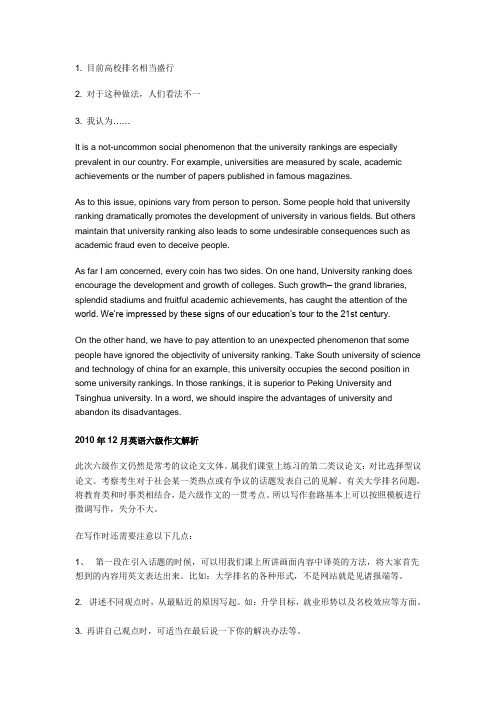
1. 目前高校排名相当盛行2. 对于这种做法,人们看法不一3. 我认为……It is a not-uncommon social phenomenon that the university rankings are especially prevalent in our country. For example, universities are measured by scale, academic achievements or the number of papers published in famous magazines.As to this issue, opinions vary from person to person. Some people hold that university ranking dramatically promotes the development of university in various fields. But others maintain that university ranking also leads to some undesirable consequences such as academic fraud even to deceive people.As far I am concerned, every coin has two sides. On one hand, University ranking does encourage the development and growth of colleges. Such growth– the grand libraries, splendid stadiums and fruitful academic achievements, has caught the attention of the world. We’re impressed by these signs of our education’s tour to the 21st century.On the other hand, we have to pay attention to an unexpected phenomenon that some people have ignored the objectivity of university ranking. Take South university of science and technology of china for an example, this university occupies the second position in some university rankings. In those rankings, it is superior to Peking University and Tsinghua university. In a word, we should inspire the advantages of university and abandon its disadvantages.2010年12月英语六级作文解析此次六级作文仍然是常考的议论文文体。
2010年12月答案
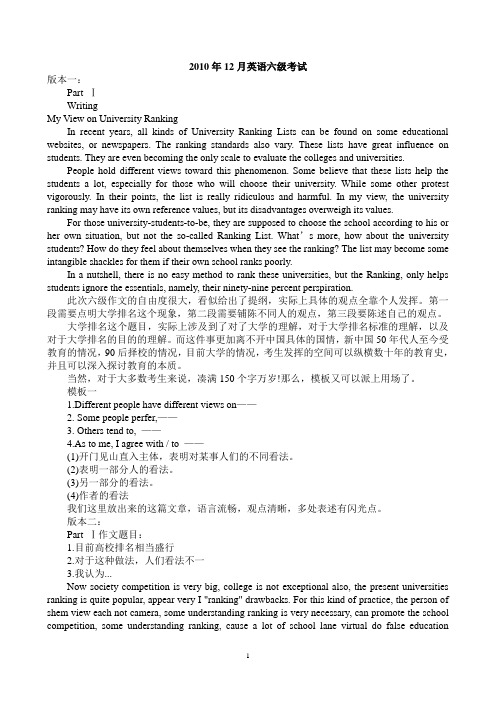
2010年12月英语六级考试版本一:Part ⅠWritingMy View on University RankingIn recent years, all kinds of University Ranking Lists can be found on some educational websites, or newspapers. The ranking standards also vary. These lists have great influence on students. They are even becoming the only scale to evaluate the colleges and universities.People hold different views toward this phenomenon. Some believe that these lists help the students a lot, especially for those who will choose their university. While some other protest vigorously. In their points, the list is really ridiculous and harmful. In my view, the university ranking may have its own reference values, but its disadvantages overweigh its values.For those university-students-to-be, they are supposed to choose the school according to his or her own situation, but not the so-called Ranking List. What’s more, how about the university students? How do they feel about themselves when they see the ranking? The list may become some intangible shackles for them if their own school ranks poorly.In a nutshell, there is no easy method to rank these universities, but the Ranking, only helps students ignore the essentials, namely, their ninety-nine percent perspiration.此次六级作文的自由度很大,看似给出了提纲,实际上具体的观点全靠个人发挥。
2010年12月份英语6级所有答案

2010年12月英语六级试题答案(完整版)Part Ⅰ作文题目:1.目前高校排名相当盛行2.对于这种做法,人们看法不一3.我认为...Now society competition is very big, college is not exceptional also, the present universities ranking is quite popular, appear very I "ranking" drawbacks. For this kind of practice, the person of shem view each not camera, some understanding ranking is very necessary, can promote the school competition, some understanding ranking, cause a lot of school lane virtual do false education quality, causing the glide! And I think the school rankings of this mechanism is should be reserved, but need to regulate the arrangement, the education development of the rankings system into motivation, not resistance.作文范文:For those university students-to-be, choosing their ideal school is never an easy job, but luckily, different authorities come up with the university ranking to help! Top students shall choose the top schools high on the list and vice versa.Complicated issue becomes easy numerical comparison, yet the real problem stays there, can the numerical ranking tell you the status quo of these universities? Are these “authorities” producing the ranking authoritative enough to make the judgments? Let’s take a seri ous look at the issue before we jump to the conclusion whether university ranking is good or bad.We have to admit that because of historical reasons, most of the 1950s-1960s parents were denied higher education and this cruel fact makes them even more eager to give their children high education even though they have no idea of what university education is all about. The ranking helps them to make decisions based on their simple idea of better ranking means better jobs in future, and therefore better income! It is pathetic that they interpret knowledge and wisdom in such a way yet it is even more pathetic that there are so-claimed well-educated people making up all the ranking and get the ranking published to mislead them!Part II快速阅读:1 D2 A3 A4 D5 D6 B7 APart III 听力(即将发布)Part IV仔细阅读:52 A53 A54 D55 A56 D57 B58 B59 C60 D61 CPart V完型填空:62-66 BCBAC67-71 CBBBD72-76 CAACD77-81 CDADCPart Ⅵ翻译:82.can not be too careful83.did I realize that reading could not be neglected84.to the researchers' surprise85.I must have left it somewhere86.would rather join you to do volunteer work。
- 1、下载文档前请自行甄别文档内容的完整性,平台不提供额外的编辑、内容补充、找答案等附加服务。
- 2、"仅部分预览"的文档,不可在线预览部分如存在完整性等问题,可反馈申请退款(可完整预览的文档不适用该条件!)。
- 3、如文档侵犯您的权益,请联系客服反馈,我们会尽快为您处理(人工客服工作时间:9:00-18:30)。
2010年12月大学英语六级考试试题Part I Writing (30 minutes)Direction: For this part, you are allowed 30 minutes to write a short essay entitled My Views on University Ranking. You should write at least 150 words following the outline given below.1. 目前高校排名相当盛行;2. 对于这种做法人们看法不一;3. 在我看来……My Views on University RankingPart II Reading Comprehension (Skimming and Scanning) (15 minutes)Directions: In this part, you will have 15 minutes to go over the passage quickly and answer the questions on Answer Sheet 1. For questions 1-7, choose the best answer from the four choices marked [A], [B], [C] and [D]. For questions 8-10, complete the sentences with the information given in the passage.Into the UnknownThe world has never seen population ageing before. Can it cope?Until the early 1990s nobody much thought about whole populations getting older. The UN had the foresight to convene a ―world assembly on ageing‖ back in 1982, but that came and went. By 1994 the World Bank had noticed that something big was happening. In a report entitled ―Averting the Old Age Crisis‖, it argued that pension arrangements in most countries were unsustainable.For the next ten years a succession of books, mainly by Americans, sounded the alarm. They had titles like Young vs Old, Gray Dawn and The Coming Generational Storm, and their message was blunt: health-care systems were heading for the rocks, pensioners were taking young people to the cleaners, and soon there would be intergenerational warfare.Since then the debate has become less emotional, not least because a lot more is known about the subject. Books, conferences and research papers have multiplied. International organisations such as the OECD and the EU issue regular reports. Population ageing is on every agenda, from G8 economic conferences to NATO summits. The World Economic Forum plans to consider the future of pensions and health care at its prestigious Davos conference early next year. The media, including this newspaper, are giving the subject extensive coverage.Whether all that attention has translated into sufficient action is another question. Governments in rich countries now accept that their pension and health-care promises will soon become unaffordable, and many of them have embarked on reforms, but so far only timidly. That is not surprising: politicians with an eye on the next election will hardly rush to introduce unpopular measures that may not bear fruit for years, perhaps decades.The outline of the changes needed is clear. To avoid fiscal (财政) meltdown, public pensions and health-care provision will have to be reined back severely and taxes may have to go up. By far the most effective method to restrain pension spending is to give people the opportunity to work longer, because it increases tax revenues and reduces spending on pensions at the same time. It may even keep them alive longer. John Rother, the AARP’s head of policy and strategy, points to studies showing that other things being equal, people who remain at work have lower death ratesthan their retired peers.Younger people today mostly accept that they will have to work for longer and that their pensions will be less generous. Employers still need to be persuaded that older workers are worth holding on to. That may be because they have had plenty of younger ones to choose from, partly thanks to the post-war baby-boom and partly because over the past few decades many more women have entered the labour force, increasing employers’ choice. But the reservoir of women able and willing to take up paid work is running low, and the baby-boomers are going grey.In many countries immigrants have been filling such gaps in the labour force as have already emerged (and remember that the real shortage is still around ten years off). Immigration in the developed world is the highest it has ever been, and it is making a useful difference. In still-fertile America it currently accounts for about 40% of total population growth, and in fast-ageing western Europe for about 90%.On the face of it, it seems the perfect solution. Many developing countries have lots of young people in need of jobs; many rich countries need helping hands that will boost tax revenues and keep up economic growth. But over the next few decades labour forces in rich countries are set to shrink so much that inflows of immigrants would have to increase enormously to compensate: to at least twice their current size in western Europe’s most youthful countries, and three times in the older ones. Japan would need a large multiple of the few immigrants it has at present. Public opinion polls show that people in most rich countries already think that immigration is too high. Further big increases would be politically unfeasible.To tackle the problem of ageing populations at its root, ―old‖ countries would have to rejuvenate (使年轻) themselves by having more of their own children. A number of them have tried, some more successfully than others. But it is not a simple matter of offering financial incentives or providing more child care. Modern urban life in rich countries is not well adapted to large families. Women find it hard to combine family and career. They often compromise by having just one child.And if fertility in ageing countries does not pick up? It will not be the end of the world, at least not for quite a while yet, but the world will slowly become a different place. Older societies may be less innovative and more strongly disinclined to take risks than younger ones. By 2025 at the latest, about half the voters in America and most of those in western European countries will be over 50—and older people turn out to vote in much greater number than younger ones. Academic studies have found no evidence so far that older voters have used their power at the ballot box to push for policies that specifically benefit them, though if in future there are many more of them they might start doing so.Nor is there any sign of the intergenerational warfare predicted in the 1990s. After all, older people themselves mostly have families. In a recent study of parents and grown-up children in 11 European countries, Karsten Hank of Mannheim University found that 85% of them lived within 25km of each other and the majority of them were in touch at least once a week.Even so, the shift in the centre of gravity to older age groups is bound to have a profound effect on societies, not just economically and politically but in all sorts of other ways too. Richard Jackson and Neil Howe of America’s CSIS, in a thoughtful book called The Graying of the Great Powers, argue that, among other things, the ageing of the developed countries will have a number of serious security implications.For example, the shortage of young adults is likely to make countries more reluctant tocommit the few they have to military service. In the decades to 2050, America will find itself playing an ever-increasing role in the developed world’s defence effort. Because America’s population will still be growing when that of most other developed countries is shrinking, America will be the only developed country that still matters geopolitically (地缘政治上).Ask me in 2020There is little that can be done to stop population ageing, so the world will have to live with it. But some of the consequences can be alleviated. Many experts now believe that given the right policies, the effects, though grave, need not be catastrophic. Most countries have recognised the need to do something and are beginning to act.But even then there is no guarantee that their efforts will work. What is happening now is historically unprecedented. Ronald Lee, director of the Centre on the Economics and Demography of Ageing at the University of California, Berkeley, puts it briefly and clearly: ―We don’t really know what population ageing will be like, because nobody has done it yet. ―注意:此部分试题请在答题卡1上作答。
